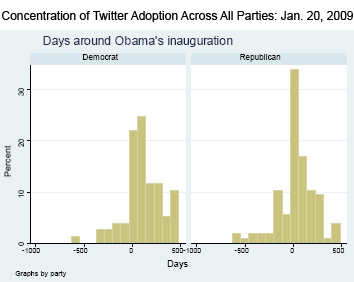Twitter and Congress
, Posted in: Inspiration, Author: nleavitt (August 15, 2010)
TweetCongress recently reported that more than 200 members of the U.S. Congress are utilizing Twitter. While this may look impressive, the numbers are still less than 50 percent and in today’s digital world, you would have thought that all 435 members would have quickly jumped on board in order to reach out to constituents – and especially as another fund-raising mechanism.
Most followed? Sen. John McCain (R-AZ), 1,717,550; Sen. Jim DeMint (R-SC), 45,836; Sen. Claire McCaskill (D-MO), 39,284; Rep. John Boehner (R-OH), 38,786; and Senate Republicans, 21,702.
Republicans also capture all top 5 spots in Tweets per day: Senate Republicans, 7.98; Rep. Charles Djou (R-HI), 4.9; Rep. Darrell Issa (R-CA), 4.02; Rep. John Carter (R-TX), 3.46; and Rep. John Boehner (R-OH), 3.44.
So how are members of Congress using Twitter – and is it proving effective? Feng Chi and Nathan Yang from the University of Toronto recently released a study entitled, “Twitter in Congress: Outreach vs. Transparency.”
To quote their abstract, “the paper provides some support in favor of Twitter adoption being driven by outreach reasons, rather than the well-popularized transparency motive. Furthermore, outreach considerations factor into a Republican’s perceived benefit more than a Democrat’s.”
Chi and Yang concluded that transparency matters more for Democrats; outreach is more important for Republicans.
“The perceived benefit of outreach is related to the impact it could have in influencing political rivals who are also on Twitter, while the perceived benefit of transparency is related to a representative’s experience,” the pair said. “A representative’s propensity to adopt Twitter increases with the number of bills he/she sponsored, which we argue is a proxy for the perceived benefit associated with government outreach through Twitter.”
Chi and Yang said their study came up short in identifying the role that constituents play in social media.
“While we would expect that politicians keep track of their constituents’ Tweets, we are uncertain whether these Tweets have any direct influence on specific details contained within important legislature. That is, does the content from a constituent’s Tweet every make its way into the content of a bill.”
Chi and Yang further postulated that if politicians are using Twitter for outreach, then they predict that those who adopt Twitter will have greater success in getting bills passed. “If politicians are using Twitter for transparency, then those who adopt Twitter should perform better in approval ratings and elections.”
I expect we’ll see a plethora of related papers on this topic shortly after the mid-term elections – stay tuned.

Comments